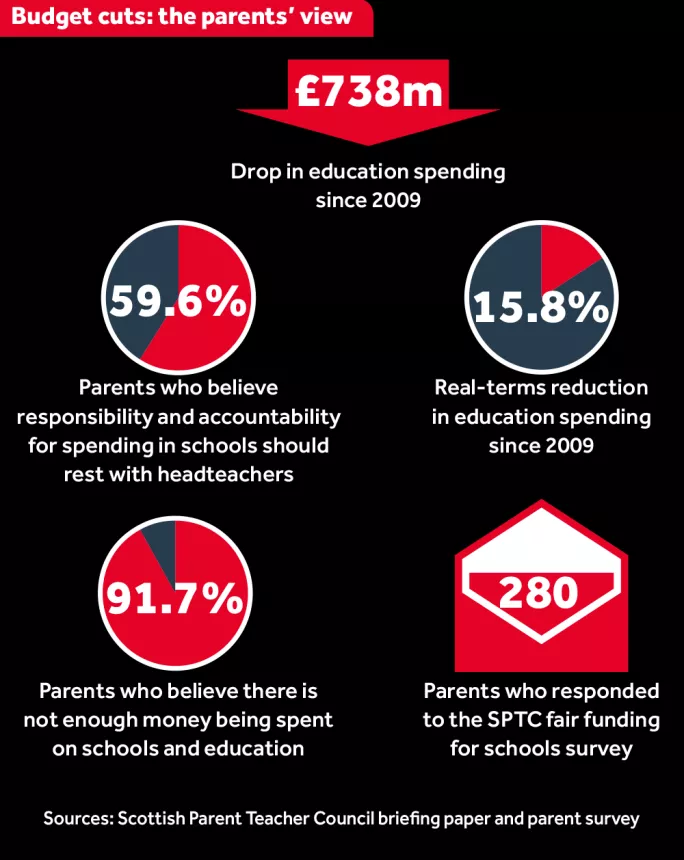The true extent of school budget cuts revealed

Education spending has fallen by more than £700 million in real terms since 2009, a parents’ organisation is claiming, as it reveals the vast majority of parents think schools are inadequately funded.
Eileen Prior, chief executive of the Scottish Parent Teacher Council (SPTC) has described the drop in funding - £738 million, or a 15.8 per cent cut in eight years - as “gobsmacking”.
It coincides with an SPTC survey of parents that reveals almost 92 per cent believe there is not enough money being spent on schools and education.
The “astonishing” cut in education spending was hitting children with additional support needs the hardest and resulting in parent councils increasingly being asked to pay for “essentials in schools”, said Ms Prior.
This was likely to exacerbate inequality, she said, given that some parent councils struggled to raise a few hundred pounds, while others could raise in excess of £50,000.
Ms Prior called for schools to be adequately funded and for parent-raised funds to be spent only on “extra items beyond the basic educational requirement”.

The SPTC wants the government to come up with a baseline of spending per child “in order to ensure quality of education”.
Its survey figures follow an analysis by the Labour Party earlier this year that put the cut to school funding at £1.2 billion since 2010. However, first minister Nicola Sturgeon insisted then that councils’ own statistics suggested that education spending was going up.
The SPTC calculated the drop in education spending for a briefing paper designed to help families to understand the current debate around school funding, so they were better equipped to take part in the government consultation on the issue, which closed last month.
The SPTC said in the briefing paper for parents: “Money spent on education services - including schools - has dropped since 2009, when it was £4.5 billion. Taking inflation into account (we have used the Consumer Prices Index to work this out), spending has fallen by £738 million (that’s 15.8%) overall over the last eight years. Pupil numbers in schools dropped a little over that same time, but have grown again in the last few years.”
Ms Prior said: “It is a bit gobsmacking when you see it laid out in those very blunt terms. It is quite an astonishing amount of money. One of the biggest issues we hear about is that the support for youngsters who have additional support needs is vanishing from classrooms, whatever those needs are - whether it is a disability or whether they don’t have English as a first language - and the impact of that is massive, both for these children themselves and the class as a whole.”
In its consultation, the government argues for more money to go directly to headteachers, saying the way funding is allocated to schools by councils currently is “complex, opaque and varies widely between local authorities”.
However, as reported in last week’s Tes Scotland (“Don’t ‘Anglicise’ Scottish education, says union”, 3 November), the EIS teaching union and local authorities body Cosla are separately warning if more cash goes directly to heads, they would have concerns about accountability for public money. Cosla - like the SPTC - criticised the consultation for looking at “how existing resources should be allocated, rather than what level of resource is fair and adequate”.
According to the SPTC, parents want heads to be given the funding and power to “truly take responsibility for their schools”. But they question whether all heads are “competent” enough to take on this role - “good headteachers will do well, but others are likely to flounder”, said the body in its submission.
A Scottish government spokeswoman said that analysis of the 94 consultation responses received was being undertaken and that it would publish its response “in due course”.
You need a Tes subscription to read this article
Subscribe now to read this article and get other subscriber-only content:
- Unlimited access to all Tes magazine content
- Exclusive subscriber-only stories
- Award-winning email newsletters
Already a subscriber? Log in
You need a subscription to read this article
Subscribe now to read this article and get other subscriber-only content, including:
- Unlimited access to all Tes magazine content
- Exclusive subscriber-only stories
- Award-winning email newsletters